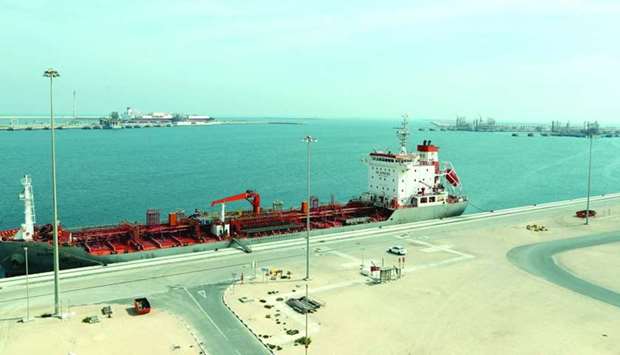Qatar’s future remains “bright” as a "massive expansion" of LNG production by about 40% will drive investment and consumption starting from 2020, says economic consultancy and research firm MENA Advisors.
“The rest of the economy will be further supported by reforms in the investment and business environment,” MENA Advisors said in a report.
Qatar, it said, has “recovered from the blockade” with key economic and market indicators all close to or even above pre-crisis levels. The focus is now on the LNG expansion, which gets underway in the 2020s.
“We expect Qatar to record growth of 2% in 2018 driven by a 5% growth in the non-hydrocarbon sector, with construction and manufacturing contributing the bulk of this growth.
“In 2019, the drag on the overall economy from the blockade should fade as financial conditions and confidence recover, helping trade, investment and consumption,” MENA Advisors said.
Key indicators point to an economy that has “largely recovered” from the blockade. Most key economic and market metrics are close to or better than their pre-blockade levels. Domestic trends, such as the infrastructure buildout, new LNG projects and reforms to investment and business environment legislation are of far greater economic significance.
Manufacturing accelerated to around 6.5% in 2018 (from 2.2% in 2017) as a result of higher production from Laffan refinery, an expansion in light industry, as part of the self-sufficiency drive that followed the blockade, and base effects following the shutdown of the Pearl GTL facility for part of 2017, according to the report.
The "main drivers of growth" in manufacturing are unlikely to persist and MENA Advisors expect growth in the sector to slow for a few years, until major new petrochemical facilities are built sometime in the mid- to late-2020s.
The construction sector was an important driver of growth in 2018, expanding by around 14.7%.
In 2019, growth is likely to pick up “marginally” as the drag on the overall economy from the blockade fades and confidence recovers, helping trade, investment and consumption.
The non-hydrocarbon sectors, excluding construction and manufacturing, should receive a boost to growth with segments such as retail, entertainment, travel and tourism accelerating.
The banking sector has proven its “resilience” in the last few years by “weathering the twin shocks” of a crash in oil prices followed by the deposit flight that followed the blockade.
The non-resident deposit base of the banks has been "rebuilt" nearly back to pre-crisis levels, "demonstrating confidence" in the banks’ stability.
As a result, banks have again started to ramp up lending to the domestic private sector.
“This easing in financial conditions should further support GDP growth over the next year,” MENA Advisors noted.
However, the slowdown in the construction sector is likely to continue as “we are now past the peak” of the infrastructure investment programme, it said.
Qatar, it said, has “recovered from the blockade” with key economic and market indicators all close to or even above pre-crisis levels. The focus is now on the LNG expansion, which gets underway in the 2020s.
“We expect Qatar to record growth of 2% in 2018 driven by a 5% growth in the non-hydrocarbon sector, with construction and manufacturing contributing the bulk of this growth.
“In 2019, the drag on the overall economy from the blockade should fade as financial conditions and confidence recover, helping trade, investment and consumption,” MENA Advisors said.
Key indicators point to an economy that has “largely recovered” from the blockade. Most key economic and market metrics are close to or better than their pre-blockade levels. Domestic trends, such as the infrastructure buildout, new LNG projects and reforms to investment and business environment legislation are of far greater economic significance.
Manufacturing accelerated to around 6.5% in 2018 (from 2.2% in 2017) as a result of higher production from Laffan refinery, an expansion in light industry, as part of the self-sufficiency drive that followed the blockade, and base effects following the shutdown of the Pearl GTL facility for part of 2017, according to the report.
The "main drivers of growth" in manufacturing are unlikely to persist and MENA Advisors expect growth in the sector to slow for a few years, until major new petrochemical facilities are built sometime in the mid- to late-2020s.
The construction sector was an important driver of growth in 2018, expanding by around 14.7%.
In 2019, growth is likely to pick up “marginally” as the drag on the overall economy from the blockade fades and confidence recovers, helping trade, investment and consumption.
The non-hydrocarbon sectors, excluding construction and manufacturing, should receive a boost to growth with segments such as retail, entertainment, travel and tourism accelerating.
The banking sector has proven its “resilience” in the last few years by “weathering the twin shocks” of a crash in oil prices followed by the deposit flight that followed the blockade.
The non-resident deposit base of the banks has been "rebuilt" nearly back to pre-crisis levels, "demonstrating confidence" in the banks’ stability.
As a result, banks have again started to ramp up lending to the domestic private sector.
“This easing in financial conditions should further support GDP growth over the next year,” MENA Advisors noted.
However, the slowdown in the construction sector is likely to continue as “we are now past the peak” of the infrastructure investment programme, it said.


